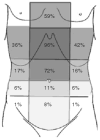Adherence to best practice guidelines in dyspepsia: a survey comparing dyspepsia experts, community gastroenterologists and primary-care providers
- PMID: 19183152
- PMCID: PMC2953468
- DOI: 10.1111/j.1365-2036.2009.03935.x
Adherence to best practice guidelines in dyspepsia: a survey comparing dyspepsia experts, community gastroenterologists and primary-care providers
Abstract
Background: Although 'best practice' guidelines for dyspepsia management have been disseminated, it remains unclear whether providers adhere to these guidelines.
Aim: To compare adherence to 'best practice' guidelines among dyspepsia experts, community gastroenterologists and primary-care providers (PCPs).
Methods: We administered a vignette survey to elicit knowledge and beliefs about dyspepsia including a set of 16 best practices, to three groups: (i) dyspepsia experts; (ii) community gastroenterologists and (iii) PCPs.
Results: The expert, community gastroenterologist and PCP groups endorsed 75%, 73% and 57% of best practices respectively. Gastroenterologists were more likely to adhere with guidelines than PCPs (P < 0.0001). PCPs were more likely to define dyspepsia incorrectly, overuse radiographic testing, delay endoscopy, treat empirically for Helciobacter pylori without confirmatory testing and avoid first-line proton pump inhibitors (PPIs). PCPs had more concerns about adverse events with PPIs [e.g. osteoporosis (P = 0.04), community-acquired pneumonia (P = 0.01)] and higher level of concern predicted lower guideline adherence (P = 0.04).
Conclusions: Gastroenterologists are more likely than PCPs to comply with best practices in dyspepsia, although compliance remains incomplete in both groups. PCPs harbour more concerns regarding long-term PPI use and these concerns may affect therapeutic decision making. This suggests that best practices have not been uniformly adopted and persistent guideline-practice disconnects should be addressed.
Figures
References
-
- Talley NJ, Vakil NB, Moayyedi P. American Gastroenterological Association technical review on the evaluation of dyspepsia. Gastroenterology. 2005;129:1756–80. - PubMed
-
- Majumdar SR, Soumerai SB, Farraye FA, et al. Chronic acid-related disorders are common and underinvestigated. Am J Gastroenterol. 2003;98:2409–14. - PubMed
-
- Everhart JE, Ruhl CE. Burden of digestive diseases in the United States Part 1: overall and upper gastrointestinal diseases. Gastroenterology. 2009;136:376–86. - PubMed
-
- American College of Physicians. Endoscopy in the evaluation of dyspepsia. Ann Intern Med. 1985;102:266–9. - PubMed
-
- American Gastroenterological Association. AGA technical review: evaluation of dyspepsia. Gastroenterology. 1998;114:582–95. - PubMed
Publication types
MeSH terms
Grants and funding
LinkOut - more resources
Full Text Sources
Medical

